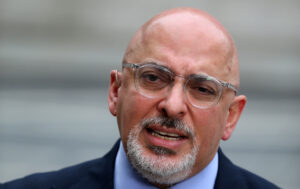Zahawi plans Covid-style tax breaks for firms facing ruin due to rising energy costs


Nadhim Zahawi has drawn up plans for a multibillion-pound package of tax cuts to help businesses facing collapse because of rising energy costs.
The chancellor, who is working on an emergency energy strategy for the new prime minister, said the government could learn the “lesson from Covid” and introduce targeted reductions in VAT and business rates to help the retail and hospitality sectors.
He suggested that tax breaks could also be given to energy-intensive industries and urged people not to “panic” about the cost of living crisis.
While he is not expected to remain as chancellor after the Tory leadership contest ends on Monday, Zahawi is understood to have discussed his plans with the frontrunner, Liz Truss, and is in line for a senior job in her cabinet.
He warned that failing to act could force many companies into bankruptcy and lead to economic “scarring”. But he insisted that Truss, if elected, would “deliver help” to families and businesses despite her failure during the campaign to make specific commitments.
Research suggests that as many as 1.7 million households could stop their direct debits next month when the latest energy price rise takes effect.
The first large-scale study into the probable extent of non-payment, carried out by Opinium, found that 6 per cent of people intended to cancel monthly payments. More than half of those said they had been inspired by the Don’t Pay campaign, which is trying to get one million people to pledge to cancel their direct debits if ministers take no further action to prevent the rise.
Zahawi said Truss would ensure that the government acted to minimise the impact of the increase next month as well as a further expected rise in January. “My responsibility is to make sure I share with her where I think the pressure is on families, on households and on business, then give her the options as to what we can do,” he said.
“The one thing she has said is that help is coming and I am confident that Liz means what she says. She will deliver that help.” He added that his “very strong advice” to people was not to “feel panicked or nervous”.
Zahawi said it was vital that as well as supporting families, the next chancellor should help businesses.
“If we don’t support businesses I worry about the longer-term scarring of the economy. I had an example given to me the other day from EDF. One of their clients, their bills have gone from £25 million a year to £75 million. This is a perfectly viable business. We have to make sure we support businesses as well as households.”
Zahawi said he was in favour of a targeted approach that helped those worst hit, similar to measures introduced during the Covid crisis.
“The lesson from Covid is that actually there are some levers like VAT, like business rates. Targeting particular sectors of the economy, whether it’s hospitality or high energy use sectors, can be done very effectively. But as I say there are no easy options,” he said.
During the pandemic the government cut VAT for the hospitality and tourism industries, costing £4 billion in lost tax revenues. The government also temporarily scrapped business rates for the retail, hospitality and leisure sectors at a cost of £16 billion.
Zahawi would not say how much money the government would make available to businesses but highlighted underspending in the government’s budget for infrastructure projects that could be used to fund the help.
The Office for Budget Responsibility has put this figure at about £6 billion so far this year. Zahawi said he was also working with the Bank of England to look at how the government could provide better liquidity in the wholesale energy market. Zahawi said this move could help reduce January’s price cap rise by up to £500. He also said he was exploring options on renewable energy.
The price cap for the average household will rise from £1,971 to £3,549 in October and is predicted to rise to more than £5,000 in January.
Read more:
Zahawi plans Covid-style tax breaks for firms facing ruin due to rising energy costs
